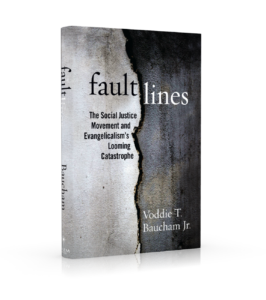
By Ken Yates1
Baucham addresses the problem of critical race theory, intersectionality, and critical social justice, and their impact on our society and Evangelicalism. These ideas view racism as being engrained in the very fabric of America. They see white privilege and white supremacy at the root of all our problems. Taken together, these ideas are the greatest threat to the gospel in our lifetime. The United States is on the verge of either a race war or a complete cultural breakdown (pp. 3-5).
Few people could write this book, and Baucham is one of those few. He is a black man who grew up poor and in a single parent home. During his early years, he experienced his share of racism. He is also an Evangelical, having graduated from Southwestern Baptist Theological Seminary. He says that the social justice movement in our country, including Black Lives Matter, is contrary to the teachings of the Scriptures. In addition, many of the cases they say point to racism in our society, such as the killing of black men by police, grossly misinterpret the evidence (pp. 43 61). Whites are more likely than blacks to be shot by police (p. 49).
Baucham is a strong Calvinist. He says he became a believer when he believed the gospel and repented of his sins (p. 24).
He points out that the antiracism movement is a religion that does not offer any salvation because it sees racism as incurable (p. 67). In their view, white people oppress people of color even when they do not realize it. A professor at Southern Baptist Theological Seminary states that white people created whiteness in order to enslave black people (p. 71).
One problem in Evangelicalism is that many leaders are falling for the teaching that being white is the problem and that America and the American church are indeed racist to the core. Racism is no longer seen as a problem with certain individuals or a matter of the sinful heart but is systemic. We must confess our sins of white racism, supremacy, and privilege (p. 77). Even when we do, it will remain. We must acknowledge this sin that can never go away or be forgiven.
Oppressed minorities include more than people of color. Women, LGBTQIA, non-citizens, the disabled, the obese, the poor, and non-Christians, among others, are part of the group. All of the oppressed have special knowledge and are able to see things that whites cannot. Baucham calls them “ethnic gnostics” (p. 92). Baucham says that Scriptures are our source of truth, not the personal feelings of oppressed groups (p. 120). He says we should pursue justice, peace, and unity, but they cannot be obtained by associating ourselves with movements that are contrary to the Scriptures and distort the gospel.
One of the strong points of the book is how Baucham describes what is going on in Evangelical seminaries and denominations such as his own Southern Baptist Convention. Seminary professors are warned not to say things contrary to the social justice mantra. Pastors must watch what they say as well. These leaders risk being fired for telling the truth (p. 138).
Americans in general, and even Evangelicals, feel the same fear that their leaders do. Over 60 percent of Americans admit that they do not say certain things because others will find them offensive (p. 154). White people are told that their inability to see what the social justice movement is saying only proves they are racists. Baucham says the problems in the black community are not systemic racism. Out of wedlock births, poor education, rising crime, and abortion, not white privilege, are four major factors hurting that community.
Baucham calls out conservative Evangelicals for bowing to the pressure.
The Black Lives Matter movement is discussed by Baucham at length. He decries the fact that many Evangelical leaders have lent their support to it. But the organization is openly pagan and feminist and pro-LGTBQIA. It seeks to destroy the family. He calls upon pastors to bravely speak the truth (p. 223).
Baucham’s use of the Scriptures is questionable when he applies certain passages to social issues. However, this is not a major part of the book. His main point is that conservative Evangelicals do not see the war raging in our midst. Our leaders, as well as the people in the pew, are succumbing to cultural movements. They either fear being called a racist or have accepted the false notion that they are, simply as the result of being a white Christian. A massive earthquake is coming, and we are already feeling the distinct rumblings underneath us. This book makes us aware of what we are confronting. I highly recommend it.
____________________
Ken Yates is a retired Army chaplain (Lt. Col). He has many theological degrees, including a Ph.D. from D.T.S. in New Testament. He and his wife, Pam, live in Columbia, SC.
__________
1 Washington, D.C.: Salem Books, 2021. 251 pp. Hardcover, $24.99.




